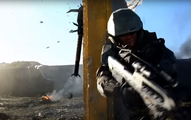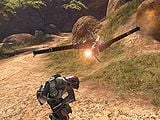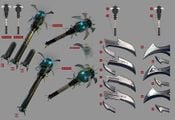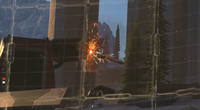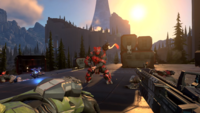Jovokada Workshop spike grenade: Difference between revisions
From Halopedia, the Halo wiki
mNo edit summary |
Sith Venator (talk | contribs) |
||
| Line 89: | Line 89: | ||
**''[[Carry On]]'' | **''[[Carry On]]'' | ||
*''[[Halo Infinite]]'' | *''[[Halo Infinite]]'' | ||
*''[[Halo: The Rubicon Protocol]]'' | |||
==Sources== | ==Sources== | ||
Revision as of 03:28, August 11, 2022
| Jovokada Workshop Spike Bomb | |
|---|---|
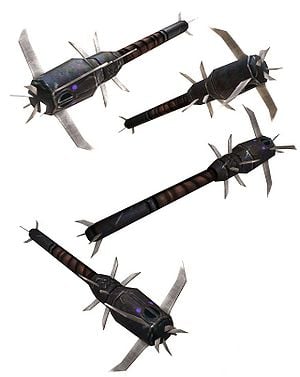
| |
| Production overview | |
|
Manufacturer: |
|
|
Type: |
Anti-personnel, fragmentation grenade |
| Specifications | |
|
Length: |
93.3 centimetres (36.7 in)[1] |
|
Weight: |
|
|
Filling: |
Shrapnel and a pyrophoric sulfur-nitrate/potassium compound (shaped charge)[1] |
|
Blast Range: |
|
| Service history | |
|
In service: |
|
- "When you decide to throw one of these things make sure to tell everyone around you, ‘cause they are dangerous all the way there."
- — UNSC serviceman
The Jovokada Workshop Spike Bomb[3] (UNSC Type classification: Type-2 Antipersonnel Fragmentation Grenade, T-2 AFG),[2] more commonly known as the Spike Grenade, table leg and nail bomb, is a Jiralhanae-manufactured grenade.[2]
Design details
The spike grenade is one of two grenade types designed and used by Jiralhanae forces in the Covenant military. Unlike the more common plasma grenade, which adheres only to living targets using a layer of plasma, the Spike Grenade uses numerous razor-like quills to seemingly be able to grip to any surface including rock, glass and energy shielding.[2] Notably, the power armor employed by Jiralhanae Chieftains is capable of repelling a spike grenade's adherent mechanisms.[4] The Spike Grenade was manufactured by the Sacred Promissory in the Covenant and Jovokada Foundry in the Banished, and both of them was developed by the Jovokada workshop.[3]
After collision, the grenade detonates, sending a cluster of super-heated metal spikes flying at a perpendicular trajectory to the surface the grenade has stuck to. The mechanism operates similarly to the UNSC M383C Linear Shaped Charge Demolition Kit. Upon detonation, the shrapnel emitted by the spike grenade reaches a temperature of approximately 270 to 315 °C and retains that heat for upwards of seven seconds.[2] These spikes will ricochet off of hard surfaces, making the grenade a deadly weapon against enemies in confined spaces. The focused direction of the spikes renders the grenade slightly less effective in open areas. The mechanism by which the explosion of the Type-2 is directed is similar to that of the M383C Linear Shaped Charge Demolition Kit. [2]
Even being hit by a thrown spike grenade can cause serious injuries akin to being "run through by a mini-baseball bat with nails sticking out of it". However, the device arms on impact, and invariably detonates before it can be extracted from a body. Some UNSC personnel believe that the spike grenade's injuries are designed to be fatal—not to force the enemy to spend time and resources treating casualties, but to make a victim die screaming.[2]
Ergonomics
The spike grenade is similar in appearance to the Model 24 Stielhandgranate grenade used in the 20th century.[2] However, it derives its namesake from the spikes on the grenade (four curved spikes on top and twelve smaller ones around the shaft) as well as the shrapnel it expels. The outer casing is constructed of an unusual porous metallic compound, though some UNSC personnel have commented that the weapon's look is deceptive and - while still heavy - the grenade is lighter than it appears to be.[2] The spike grenade bears a heavy visual resemblance to the Brute landmine.
Operational history
Spike grenades were first encountered by UNSC forces during the First Battle of Harvest in 2525.[5] Like most Jiralhanae weaponry, they became much more prominent during the onset of the Great Schism in 2552, and were widely employed by loyalist forces of the Prophet of Truth during the Battle for Earth and Battle of Installation 00.[6][4][7] The UNSC would eventually capture some samples of Spike Grenade weaponry and test them at Outpost C9 and the Covenant "Snowbound" facility, leading it to becoming one of many weapons and vehicles featured in the report Machines, Materiel and Munitions from the Human-Covenant Conflict, 2525 - Present.[2] Spike grenades continue to be used after the Human-Covenant War, most noticeably the Banished.
Gameplay tactics
This grenade is very effective in suppressing enemy movement in closed environments. Unwary combatants can be mowed down easily by a hail of spikes. The grenade can also be used against vehicles, surprisingly doing more damage than plasma grenade and frag grenade.
- Although this grenade cannot stick Brute Chieftains and War Chieftains, the player can kill them with it by sticking their weapon, sticking the wall right next to them, or throwing it so it lands between their legs on the ground like a frag grenade.
- The grenade is extremely useful when thrown at corners where the damage inflicted would be toward the facing walls. The spikes ejected will reflect off of walls on a shallow angle and will be focused if thrown into a corner.
- Because it is the largest grenade, it is the easiest to detonate by shooting.
- Although the radius of the spike grenade is limited, the area in the radius is deadly. A spike grenade is more damaging to vehicles than a plasma grenade. It is able to destroy a Scorpion in four sticks, and it can stick to almost anything, unlike the plasma grenade, which can only stick to vehicles or living things. Spike grenades are also lethal if thrown inside a bubble shield, since the shield will deflect the spikes so that they shower all over anyone inside it. If one sticks the shield generator itself, it will destroy the shield and damage anyone inside it, leaving them vulnerable to another grenade or gunfire.
- The grenade can be used against jumping targets, just throw it directly under the jumping target and the power of the grenade`s spikes should kill the target.
Changes from Halo 3 and Halo 3: ODST to Halo Infinite
- Shrapnel from the spike grenades no longer instantly kill a Spartan.
- Spike grenades explode a few seconds after being thrown if it stays in the air.
- Spike grenades now have kinetic properties.
UNSC remarks
- “It’s like a table leg with machetes bolted to it. Who the hell makes a weapon like that? Did those guys actually get up into space on their own?”[2]
- “The casing is constructed of an unusual porous metallic compound. Shrapnel from the Spike Grenade reaches a temperature of approximately 270 to 315°C, around 530°F, and retains that heat for upwards of seven seconds, by design.”[2]
- “It’s not as heavy as it looks, but it’s still like trying to throw a softball bat.”[2]
- “Those things ain’t made to wound anyone – to make you use up time and resources treating casualties. They were designed to make you die screaming.”[2]
- “I’ve heard guys say that there’s nothing as scary as seeing one of these slam into a wall – or a man – you’re standing next to. Well, those guys have never seen a whole squad of baby kongs huckin’ ‘em in their direction at the same time – ‘cause that is some scary ****.”[2]
- “It’s like a shotgun that shoots flaming chainsaws at mike foxtrots – except you throw it.”[2]
Trivia

|
Browse more images in this article's gallery page. |
- The Halo 3 Official Guide incorrectly claims that Spike Grenades will stick to Bubble Shields and Jackal Shields. It does not do this. Instead, it rebounds much faster than thrown. The reason that the grenades don't stick on plasma shielding is because they don't have any bulk to grab.
Gallery
A spike grenade in Halo: Landfall.
An in-game view of the Spike Grenade in Halo 3.
A Spike Grenade detonating on High Ground.
Halo Online concept art of the Spike Grenade.
A spike grenade sticking to a drop wall in Halo Infinite.
List of appearances
- Halo: Landfall
- Halo: Combat (First appearance)
- Halo: Last One Standing
- Halo 3
- Halo: Contact Harvest
- Halo 3: ODST
- Halo: Retribution
- Become
- Halo Infinite
- Halo: The Rubicon Protocol
Sources
| ||||||||||||||||||||
